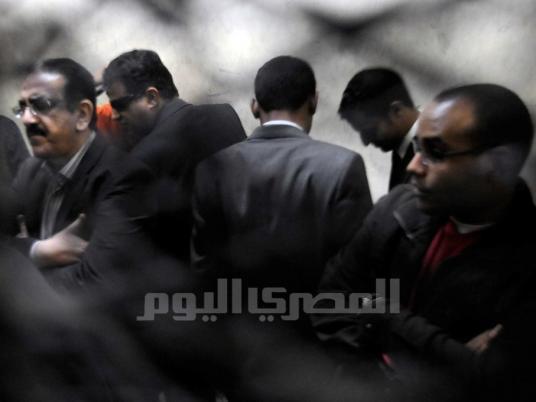
By the end of 1984, torture in places of detention returned strongly after a hiatus of just a few months, following the first term of President Hosni Mubarak.
With the rise in the number of torture cases, political activists thought of providing legal assistance to the victims. The idea soon evolved and the Egyptian Organization for Human Rights was formed in 1985 to be the first of its kind in the country.
The work of human rights organizations was not limited to politics, but spread to cultural and economic activities that impact millions of Egyptians. For example, the government was requested to set a minimum wage and remove sequesters of trade unions. Also, those organizations held cultural events that the government was not interested to undertake, and filled the cultural vacuum that was occupied by the Islamists.
Since that date, the relationship between the successive governments and the human rights organizations was governed by persecution, accusation and mistrust.
Now that the Ministry of Social Solidarity identified the civil society organizations that are not subject to the law on NGOs in order to bring them to account, Al-Masry Al-Youm decided to tackle the history of the cat and mouse game between the government and those organizations.
A difficult question: Closure or continuation?

When Malek Adly started working at the Hisham Mubarak Law Center, the manager asked him if he would bear the security harassment that could sometimes amount to detention. He agreed.
Nearly 10 years later today, Adly, a lawyer at the Egyptian Center for Economic and Social Rights, sits in his office among numerous files pertaining to the deadline that was set by the Ministry of Social Solidarity for civil society organizations to legalize their status in accordance with Law No. 84 of 2002, which the center refused to abide by.
“We have no choice,” he says. “This is what we do.”
The government deals with the civil society organizations that work in development and those that work in human rights as if they were the same, whereas there is a big difference between them.
“Human rights organizations that provide direct legal support are realy law offices that are subject to the legal code,” Adly explains.
He says the storming of human rights organizations that took place and the arrest of their employees was for political reasons when the Supreme Council of the Armed Forces differred with the United States over this issue in 2011.
“No international organization could register itself in Egypt under Mubarak,” he says. “They were left to work without license.”
He adds that he refuses to abide by a law that does not conform to the United Nations standards and that violates the Constitution, which provides for the establishment of associations by mere notification. “The problem with Law 84 of 2002 is that it can suspend any association with an administrative decision and without reason,” he says.
This is not the first time that the government gives organizations a deadline to legalize their status. They refused before to register themselves as associations working under the arm of the government. Among them was the Arab Center for the Independence of the Judiciary, which is headed by Nasser Amin, a member of the National Council for Human Rights.
“We have been fighting this battle for more than 12 years,” Amin says, contending that requesting human rights organizations to legalize their status is but an attempt to place them under a restrictive and notorious law, although the government tended to amend it two years ago.
“We are studying ways to abide by the law and other ways to abolish it by litigation,” he says. “This will depend on the government as to whether it is willing to legalize the matter or control it.”
The police stormed the offices of a number of such organizations, most notably the El Nadim Center for the Rehabilitation of Victims of Violence and Torture. “It was not an attack on us alone,” says co-founder Susan Fayad. “We considered it an attack on freedom of association, be it a trade union, a human rights organization or a political party.”
“Theoretically, the law gives the right to freedom of association and considers it an integral part of freedom of expression, as upheld by the Supreme Constitutional Court Commissioners,” she says.
Fayad categorically rejects all accusations concerning funding, denying that any of the organizations received funding after the revolution without the knowledge of the government. “Foreign funding is announced and is transferred through the banks,” she says. “And all organizations pay taxes.”
“Also, all contracts between Egyptian and foreign organizations are part of international agreements declared by the Egyptian government,” she says.

Ahmed Kheir, co-founder of the IT Support Center, says the law restricts the work of civil society organizations among the masses. “It makes an organization lose its independence and puts it under the umbrella of the executive power, which should be supervised by these organizations in the first place,” he says.
Mohamed Zarea of the Arab Organization for Penal Reform says the organization has been working for ten years as a profit-making law firm under the law governing companies. “How can you turn companies into NGOs and place them under security supervision when they basically offer legal advice,” he wonders.
“I will not work in a country that does not support or recognize me,” he says. “if the country wants to be civilized, it must support civil society organization and stop playing a cat and mouse game with them.”
The conflict was not only with human rights organizations, but also with cultural institutions. The Al-Mawred Cultural Foundation was one of the limited outlets for independent young artists. It worked on disseminating culture and art in poor and marginalized areas, training residents to start cultural projects in their neighborhoods.
A day before the end of the legalization deadline, the foundation announced that it stopped all its activities in Egypt due to annoyances, and hoped that conditions would allow it to return to Egypt as soon as possible.
Many cultural institutions and events came from under the mantle of Al-Mawred, such as the Arab Cultural Fund, the Garden Theater of the Al-Azhar Park, the al-Darb al-Ahmar Arts School and the International Festival of Contemporary Circus Arts that was organized in collaboration with the European Union Commission in Egypt, the Tourism Promotion Authority and the Ministry of Culture in 2010.
Verbal wars and storming of premises

On 3 February 2011, the military police arrested employees of the Hisham Mubarak Law Center and confiscated their files and computers. After three days of interrogating them on charges of collaborating with foreign parties, they were released. This was the beginning of a new phase of the conflict between the government and the civil society organizations after the revolution.
Under the rule of the Supreme Council of the Armed Forces in late 2011, the state-owned media launched an offensive against human rights organizations, while the police stormed the offices of 17 foreign and Egyptian organizations and referred 43 of their employees to court on charges of forming branches of foreign organizations and receiving external funding.
With the rise of the Muslim Brotherhood to power, public consultations were held to amend Law No. 84, but they were not well received by the civil society. According to a report issued by the Cairo Institute for Human Rights Studies, the organizations accused the Freedom and Justice Party of replacing the National Democratic Party in its practices against human rights. For the Muslim Brotherhood submitted two draft laws on NGOs that adopted more restrictive provisions than the law of Mubarak, as they granted security agencies the right to monitor NGO activities and considered their private funds as public and their employees as government employees.
Although the United Nations High Commissioner for Human Rights criticized the draft laws in a statement issued in May 2013, Mohamed Morsy sent them to the Shura Council for adoption, an act that was rejected by 41 human rights organizations in a joint statement.
After the fall of the Muslim Brotherhood, Prime Minister Hazem al-Beblawy took a different approach with civil society organizations.
His government started a dialogue over a new draft law that was prepared by Minister of Solidarity Ahmed al-Borai at the end of 2013, which the government also presented to the United Nations High Commissioner for Human Rights for it to be more consistent with international standards. And in February 2013, the government was prepared to submit it to parliament once it is elected. This was welcomed by civil society
But after President Abdel Fattah al-Sisi came to power, Minister of Social Solidarity Ghada Wali announced a new draft law that was similar to the draft laws of the Muslim Brotherhood. and she warned civil society organizations of disbandment in 45 days ending on 10 November 2014 if they did not legalize their status in accordance with Law 84 of 2002, which Egypt had before the United Nations pledged to amend.

Meanwhile, security forces confiscated printed material of the Arabic Network for Human Rights Information and the Egyptian Center for Economic and Social Rights in Cairo and Alexandria.
On 24 July 2014, 23 Egyptian human rights organizations requested Prime Minister Ibrahim Mehleb to withdraw Wali’s draft law. He promised to meet with them within ten days to discuss this issue, but the meeting never took place.
And day before the legalization deadline, the Ministry of Social Solidarity issued a statement saying that it will make a list of the entities that did not legalize their status in order to inform them of their rights and obligations. It concluded the statement with: “The ministry is confident of the cooperation of the civil society organizations that are keen on respecting the Constitution and the rule of law.”
Edited translation from Al-Masry Al-Youm




